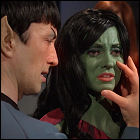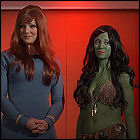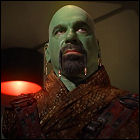This is an episode of a fan-made series whose storyline may be invalidated by later official studio productions.
Stardate not given: The Enterprise comes across a damaged and drifting Tellarite vessel with a single life form aboard. When beamed aboard, the ship’s sole survivor is an Orion slave girl who is prepared to fight off the entire crew of the Enterprise to save herself. She finally reveals her name – Lolani – and declares her wish to be free of the Orion system of slavery. But since Orion is not a Federation member word, Captain Kirk’s hands are tied when Lolani’s master comes to reclaim her. When he decides to go against express orders to avoid provoking the Orions by ignoring their laws, Kirk simply seems to make things worse, not only for himself but for a woman determined to change life for all women on her world.
written by Paul Bianchi and Huston Huddleston
story by Huston Huddleston & Vic Mignogna
directed by Chris White
music by Fred Steiner
additional music by Vic MignognaCast: Vic Mignogna (Captain Kirk), Todd Haberkorn (Mr. Spock), Larry Nemecek (Dr. McCoy / Tellarite Crewman), Chris Doohan (Mr. Scott), Grant Imahara (Sulu), Kim Stinger (Lt. Uhura), Michele Specht (Dr. McKennah), Lou Ferrigno (Zaminhon), Fiona Vroom (Lolani),
Matthew Ewald (Crewman Kenway), Erin Gray (Commodore Gray), Daniel Logan (Ensign Tongaroa), Reuben Langdon (Security Guard), Scott Grainger (Security Officer), Hannah Barucky (Crew Member), Stephanie Hall (Security Guard), Michelle Siles (Crew Member), Dom Baldwin (Security Guard), Abbey Hazel (Nurse Temple), Alexandra Preston (Crew Member), Felia Mano (Crew Member), Adam George (Crew Member), Stephen Cevallos (Security Guard), Danny Pytell (Crew Member), Donald Huston (Crew Member), Megan Warner (Crew Member), Hayley Warner (Crew Member), Kevin Fry-Bowers (Sev Bim Jor), Ryan T. Husk (Tellarite Mercenary)
Notes: Guest star Lou Ferrigno is best known for another role which required him to be painted green, as 1970s TV superhero The Incredible Hulk. Erin Gray is another ’70s genre star, known to fans of Buck Rogers In The 25th Century as Colonel
Wilma Deering. Daniel Logan may still be best known as the young Boba Fett, a role he played as a boy in 2002’s Star Wars Episode II: Attack Of The Clones. Matthew Ewald also guest starred as a young James T. Kirk in The Protracted Man, an episode of the fan series Star Trek Phase II. Co-writer Huston Huddleston is the organizer of the Enterprise-D Bridge Restoration Project, a non-profit, fan-supported project to build a museum around recovered pieces of the Star Trek: The Next Generation bridge set, both screen-used and replicas left over from the now-defunct Las Vegas Hilton Star Trek: The Experience attraction.
LogBook entry & review by Earl Green
Review: After being thoroughly underwhelmed with Star Trek: Into Darkness, it’s breathtaking to be reminded that, a decade and a half into the 21st century, Star Trek can still be done this well. As with Pilgrim Of Eternity, Star Trek Continues nails the  look and feel of the classic series so well, you’d think this was an episode from a 1969-1970 season that has been covered up all these years.
look and feel of the classic series so well, you’d think this was an episode from a 1969-1970 season that has been covered up all these years.
But more than that, this episode – focusing on women’s rights – feels absolutely right. It’s tempting to say that Gene Roddenberry himself would smile proudly upon this one had he produced it, and yet there’s the dichotomy: he was hardly known as the most progressive man in Hollywood where his own treatment of women was concerned. His enlightened, emancipated vision of the future still tended to cast women in support and caretaker roles, dressing them in skirts whose brevity was improbably impractical. And in the final episode of Star Trek’s original run, we learned that Starfleet was happily keeping its own glass (or transparent aluminum?) ceiling in place: women could do anything but command a starship. Given the strides that Star Trek had made in racial and ethnic equality, the thought of women being denied the captain’s chair because they were women  was laughable at best, and completely unraveled the rest of the show’s progressive outlook at worst.
was laughable at best, and completely unraveled the rest of the show’s progressive outlook at worst.
A woman was not seen, on screen, commanding a Starfleet ship until 1986’s Star Trek IV: The Voyage Home. No Star Trek series featured a regular female cast member in a command role until the premiere of Star Trek: Deep Space Nine in 1993.
Lolani is a challenge to Turnabout Intruder (an episode which Star Trek Continues’ debut short expanded upon). Where the original series’ finale painted Janice Lester as crazy for railing against Starfleet being (to quote James Brown) a man’s world, Lolani digs a lot deeper. Probably, for a few viewers, uncomfortably deep. Lolani touches upon the double standards applied to women defending themselves from violence, the sliding scale of respect that goes hand-in-hand with women’s mode of dress, and other topics. Some of it’s handled with a tone that’s a little bit preachy (not that this would be the only issue-based Trek ever to have done that), some of it’s handled very organically within the story (Dr. McKennah having to go out of her way to point out that the entire male bridge crew  is staring at Lolani during her tour stop at the bridge). Lolani’s presence proves so distracting that the entire male complement of the Enterprise’s crew has to be innoculated against her pheromones, which put me in mind of Star Trek: The Motion Picture‘s Ilia – why did she, alone, have to swear an oath of celibacy? In Roddenberry’s future, why can’t everyone keep their eyes and hands to themselves? In our more-enlightened-than-the-1960s present, why can’t we do that now? The answer’s fairly easy: men are still writing the rules, and the objectification of women is still part of the rulebook.
is staring at Lolani during her tour stop at the bridge). Lolani’s presence proves so distracting that the entire male complement of the Enterprise’s crew has to be innoculated against her pheromones, which put me in mind of Star Trek: The Motion Picture‘s Ilia – why did she, alone, have to swear an oath of celibacy? In Roddenberry’s future, why can’t everyone keep their eyes and hands to themselves? In our more-enlightened-than-the-1960s present, why can’t we do that now? The answer’s fairly easy: men are still writing the rules, and the objectification of women is still part of the rulebook.
Like the best Star Trek segments, Lolani should provoke discussion and debate – and hopefully, among some segments of fandom, introspection. While the security officers are building a case against Lolani, the case for her is most often made by Dr. McKennah (who, incidentally, is played by an actress who’s been on the receiving end of more than her share of internet wolf whistles and catcalls). As easy as it has always seemed to call out Roddenberry’s vision of the future for dressing its female officers in impractical outfits that are  seemingly designed for tittilation’s sake, Lolani raises a new question: why should it even matter? Don’t you have helm controls you need to be looking at? In recent years, open discussions of convention harrassment incidents have brought the wider feminist conversation to the surface in SF fandom. Often, that conversation has had to be raised to a shout just to overpower the “dudebro” mentality that makes it necessary in the first place – which only reinforces that the topic needs discussing, even among a group of people often renowned for more progressive thought.
seemingly designed for tittilation’s sake, Lolani raises a new question: why should it even matter? Don’t you have helm controls you need to be looking at? In recent years, open discussions of convention harrassment incidents have brought the wider feminist conversation to the surface in SF fandom. Often, that conversation has had to be raised to a shout just to overpower the “dudebro” mentality that makes it necessary in the first place – which only reinforces that the topic needs discussing, even among a group of people often renowned for more progressive thought.
The guest casting here is off-the-scale: Fiona Vroom delivers such a standout performance as Lolani that it’s easy to overlook the big names brought in to fill other roles. Previously a guest star on such series as Kyle XY, Supernatural, Eureka and Human Target, she holds her own against the almost impossibly imposing presence of former Incredible Hulk Lou Ferrigno. It’s easy to fall back on the joke about painting Ferrigno green, but he brings a physicality to the role that makes Kirk’s attempt to subdue him seem almost suicidal. Ferrigno’s natural accent is an asset here as well. Doe-eyed Matthew Ewald also stands out  against the big names as a crewman who is impressed with Lolani in ways that extend beyond the physical. It’s nice to see Buck Rogers’ Erin Gray as an admiral (a succinct answer, if any is still needed, to Turnabout Intruder‘s claim that female officers can’t attain command rank: here’s a woman who holds flag rank), but my favorite out-of-left-field celebrity guest shot is Daniel “L’il Boba Fett” Logan, all grown up and serving as the Enterprise’s first resident New Zealander (complete with a Maori surname). It’s a relief to hear that New Zealand isn’t just the Federation’s penal colony in the future!
against the big names as a crewman who is impressed with Lolani in ways that extend beyond the physical. It’s nice to see Buck Rogers’ Erin Gray as an admiral (a succinct answer, if any is still needed, to Turnabout Intruder‘s claim that female officers can’t attain command rank: here’s a woman who holds flag rank), but my favorite out-of-left-field celebrity guest shot is Daniel “L’il Boba Fett” Logan, all grown up and serving as the Enterprise’s first resident New Zealander (complete with a Maori surname). It’s a relief to hear that New Zealand isn’t just the Federation’s penal colony in the future!
Lolani is a provocative story that refuses to hand out pat answers on a plate and say “Oh, wait, here’s how to fix the problem!” Even when it looks like Kirk’s going to rush to the rescue, having made grand pronouncements about disobeying direct orders, doesn’t quite end up doing what he thought he’d be  doing. The fact that nobody really wins is simply the inevitable end result of failing to challenge the status quo in a meaningful way, and the unsettlingly unresolved conclusion of Lolani is a challenge to the audience: even Captain Kirk screwed this one up. What would you do to do better? (It’s telling that Kirk, veteran womanizer that he is, is unable to do anything; Ewald’s character, on the other hand, seems to have reached a tipping point that Kirk is unable to reach without throwing it all away.)
doing. The fact that nobody really wins is simply the inevitable end result of failing to challenge the status quo in a meaningful way, and the unsettlingly unresolved conclusion of Lolani is a challenge to the audience: even Captain Kirk screwed this one up. What would you do to do better? (It’s telling that Kirk, veteran womanizer that he is, is unable to do anything; Ewald’s character, on the other hand, seems to have reached a tipping point that Kirk is unable to reach without throwing it all away.)
All worthwhile questions on a worthwhile topic, thanks to a most worthwhile episode that threatens to erase the line between home-grown productions and Hollywood, in both production and script quality.





